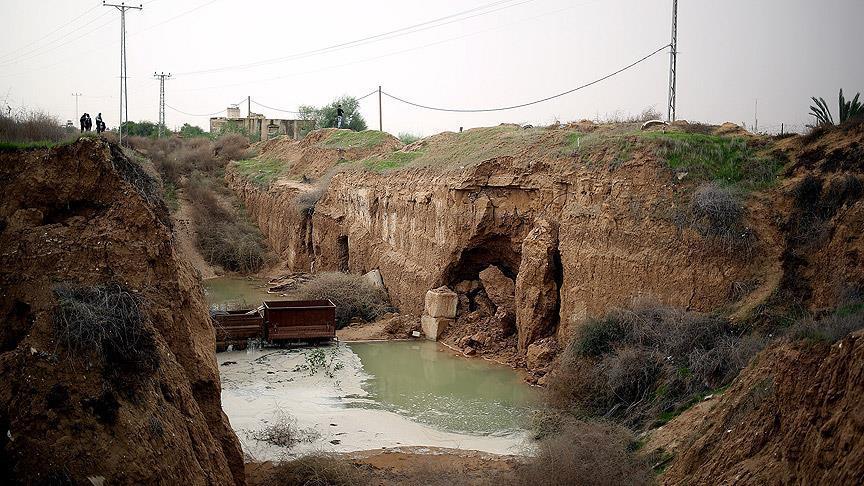Gaza tunnels dig deep into Israel’s security plans
Next war between Israel and Gaza-based resistance groups will be largely fought underground, say Palestinian analysts

Gazze
By Ola Attalah
GAZA CITY
A sprawling network of underground tunnels running under the border between the Hamas-run Gaza Strip and Israel poses a permanent security threat to the Jewish state, analysts say.
"The tunnels have become a major security headache for Israel," Palestinian political analyst Adnan Abu Amer told Anadolu Agency.
He said the network of subterranean tunnels would probably be "the cause of the next war" between Israel and Gaza-based resistance groups.
"The tunnels are now one of most important strategic weapons [of the Palestinian resistance]; they pose a genuine threat to Israel," Abu Amer said.
Israel, he added, is now scrambling to collect as much information as it can about the subterranean passages running under its border with the Hamas-run coastal enclave.
Deadly effect
Hamas, which has governed the Gaza Strip since 2007, has reportedly built dozens of such underground tunnels.
During Israel’s 51-day military onslaught against Gaza in mid-2014, the tunnels were used by Hamas fighters -- with deadly effect -- to strike Israeli forces.
"The tunnels played a key role in allowing Hamas fighters to confront the Israeli army during the latter’s ground offensive in Gaza," Abdel-Sattar Qassim, a Palestinian political analyst at Birzeit University, told Anadolu Agency. "With the use of the tunnels, [resistance fighters] managed to capture an Israeli soldier and kill scores of others."
During the 2014 conflict, more than 2,322 Palestinians were killed in the Gaza Strip -- the vast majority of them civilians -- and 11,000 others injured, while much of the strip’s vital infrastructure was destroyed by fierce Israeli bombardment.
According to Israeli figures, meanwhile, 68 Israeli soldiers and five civilians were killed in the conflict and 2,522 Israelis -- including 740 soldiers -- were injured.
During the offensive, the Israeli army announced that it had destroyed over 30 cross-border tunnels, with some Israeli military officials expressing surprise at the extent of the tunnel-building.
‘1st line of defense’
Qassim described the elaborate tunnel network as Gaza’s "first line of defense" against Israeli aggression.
"The resistance is aware that the next battle with Israel will be a tough one; that’s why it is working tirelessly to develop its [military] capabilities," he said.
Last week, leading Hamas member Ismail Haniyeh said the Ezzedine al-Qassam Brigades, the group’s armed wing, would continue its policy of digging cross-border tunnels.
"Thanks to the tunnels, the mujahidin [Hamas fighters] have carried out heroic operations and captured [Israeli] soldiers," he declared.
Haniyeh’s comments came after seven Qassam fighters were killed in a tunnel collapse under the Gaza-Israel border.
Qassim pointed out that the underground tunnels also played a psychological role in the ongoing war of nerves between Hamas and Israel.
The tunnels "elicit fear and panic" among the Israelis, he said, especially those living in southern Israel near the Gaza border, who reportedly frequently complain that they can hear construction noises coming from under their homes.
On Monday, however, Israeli Defense Minister Moshe Ya’alon asserted that no tunnels had been detected under Israeli homes.
"No underground tunnels from the Gaza Strip have so far been located in Israeli territory," Ya’alon told Israel Radio. "Security forces were checking every report by residents in the Gaza periphery."
‘Strategic weapon’
Palestinian analyst Wasif Erekat, for his part, described the subterranean tunnels as a potential "minefield" for Israel.
"The tunnels are a strategic weapon for Hamas," Erekat told Anadolu Agency. "And the group will seek to develop this weapon by all means in a way that makes it impossible for Israel to detect."
On Sunday, leading Hamas member Khalil al-Hayah said the tunnel that collapsed last week had been used to capture an Israeli soldier during Israel’s 2014 offensive.
According to Erekat, Gaza-based resistance groups are working tirelessly to expand the tunnel network.
"The next war will take place underground," he predicted. "Israel realizes that any future war on Gaza will be totally different from past conflicts."
The Gaza Strip continues to reel under a crippling blockade imposed by Israel and Egypt after Hamas seized control of the coastal enclave in 2007 after sweeping Palestinian legislative polls one year earlier.
For the past eight years, Gaza’s roughly 1.9 million inhabitants have relied on tunnels dug under the border with Egypt to import desperately-needed goods, including food, fuel and medicine.








